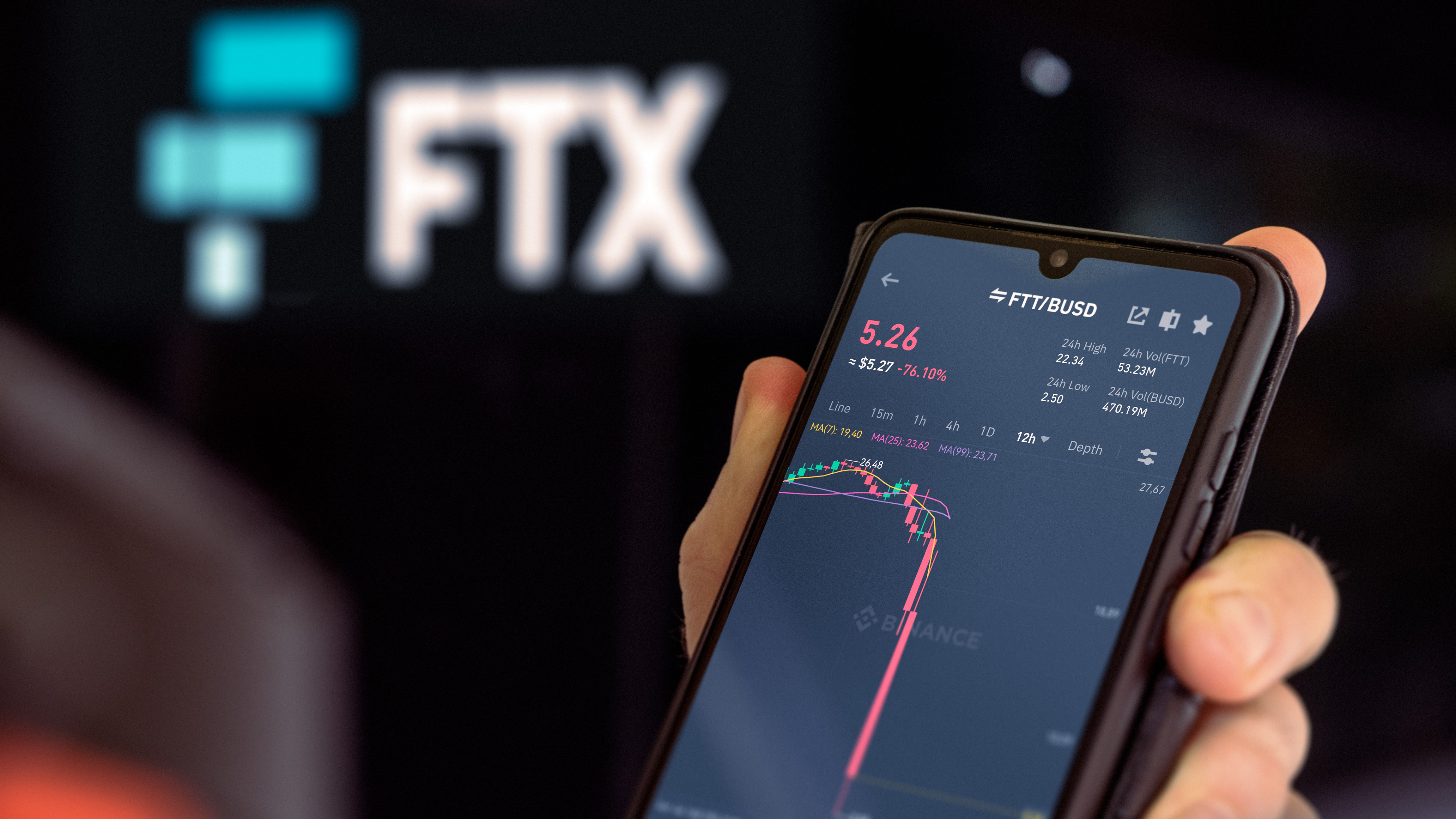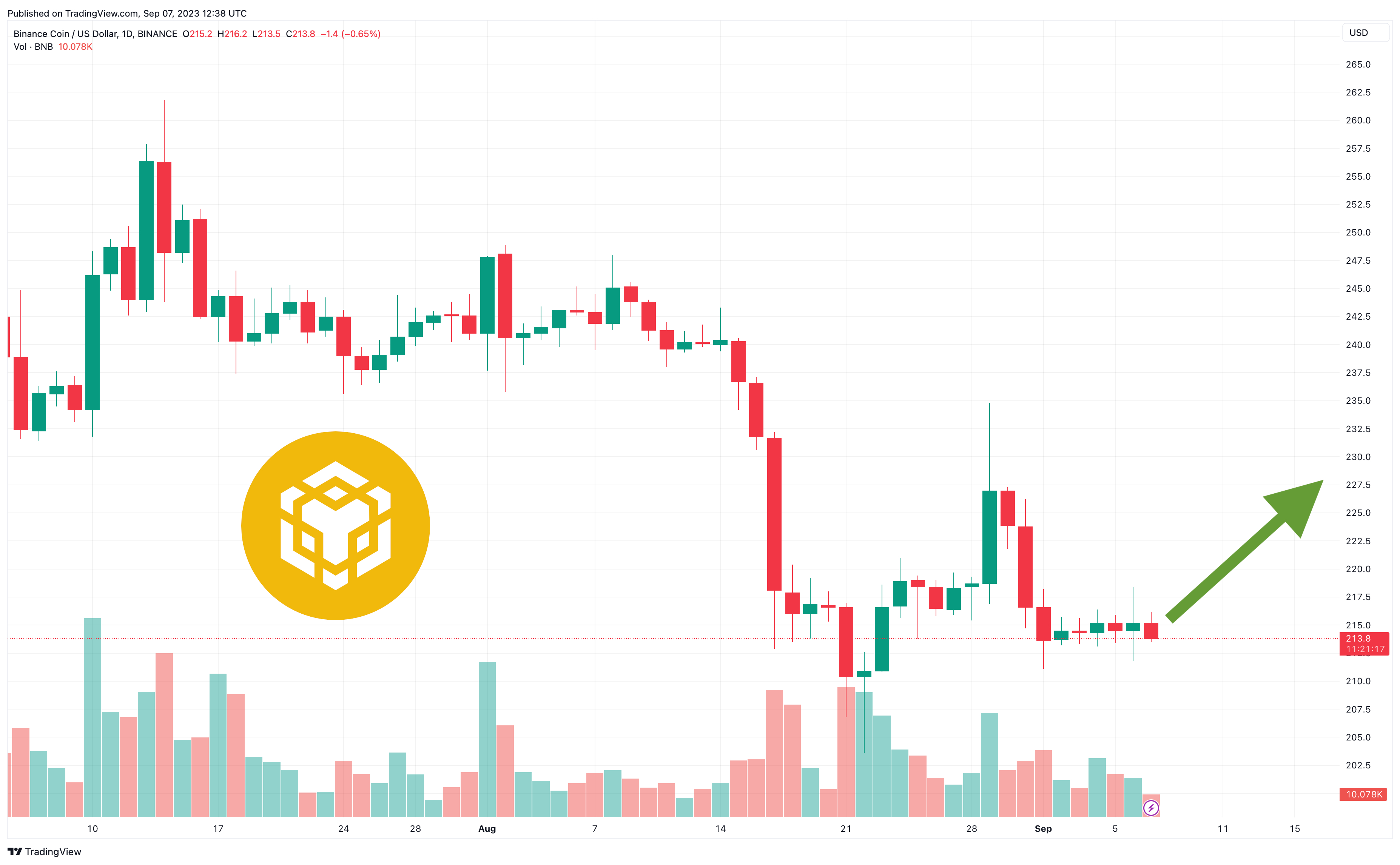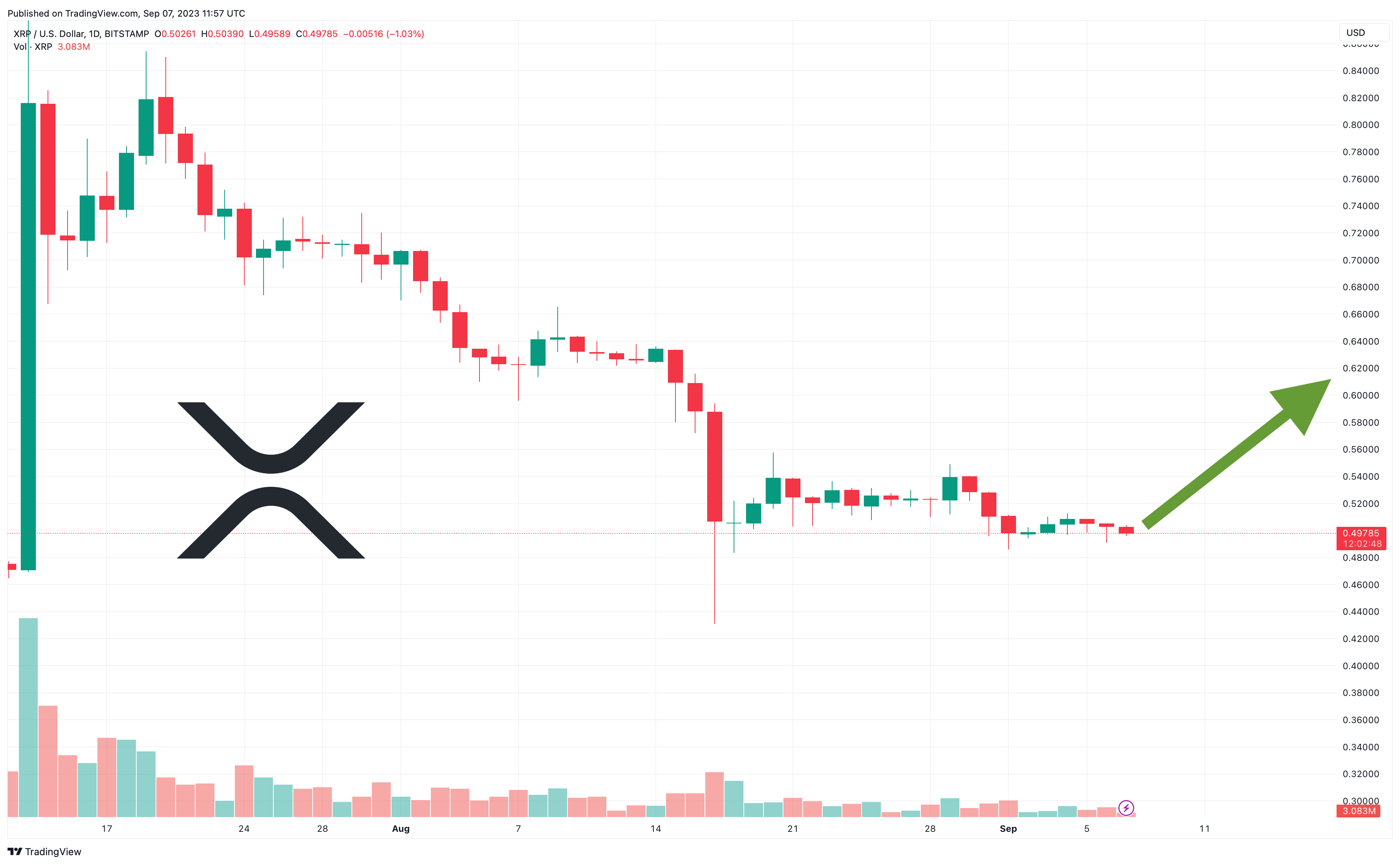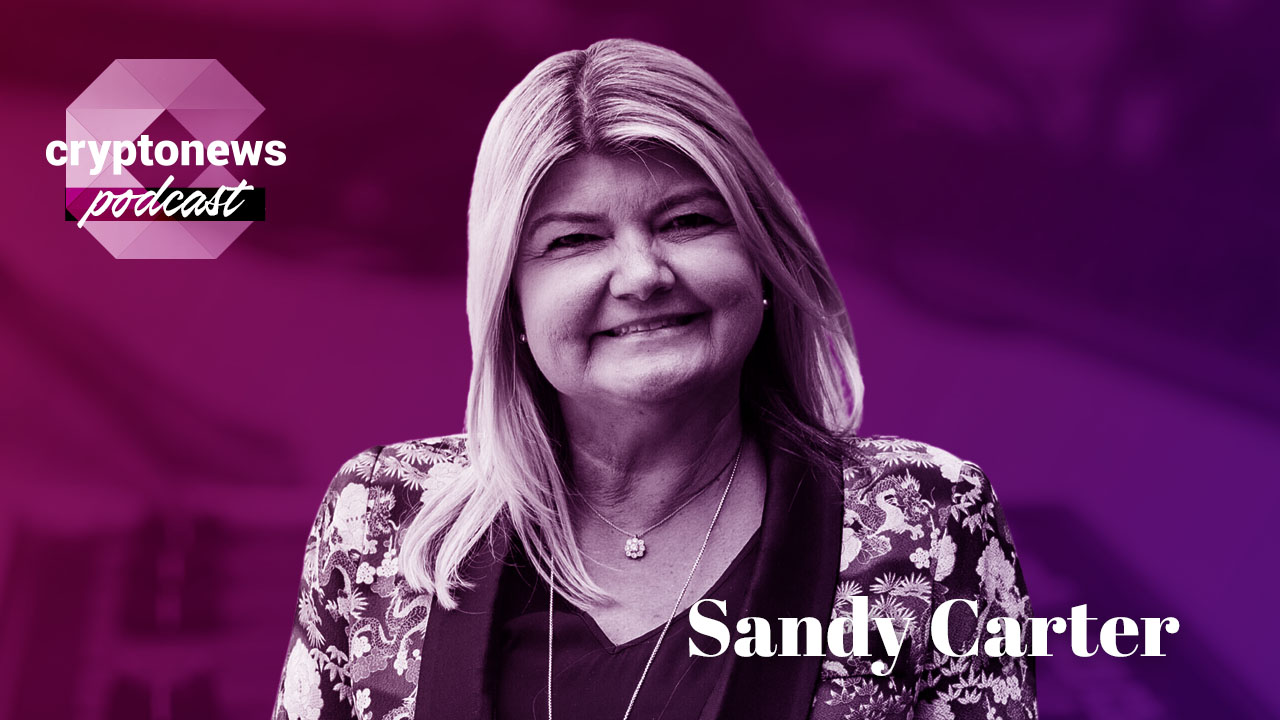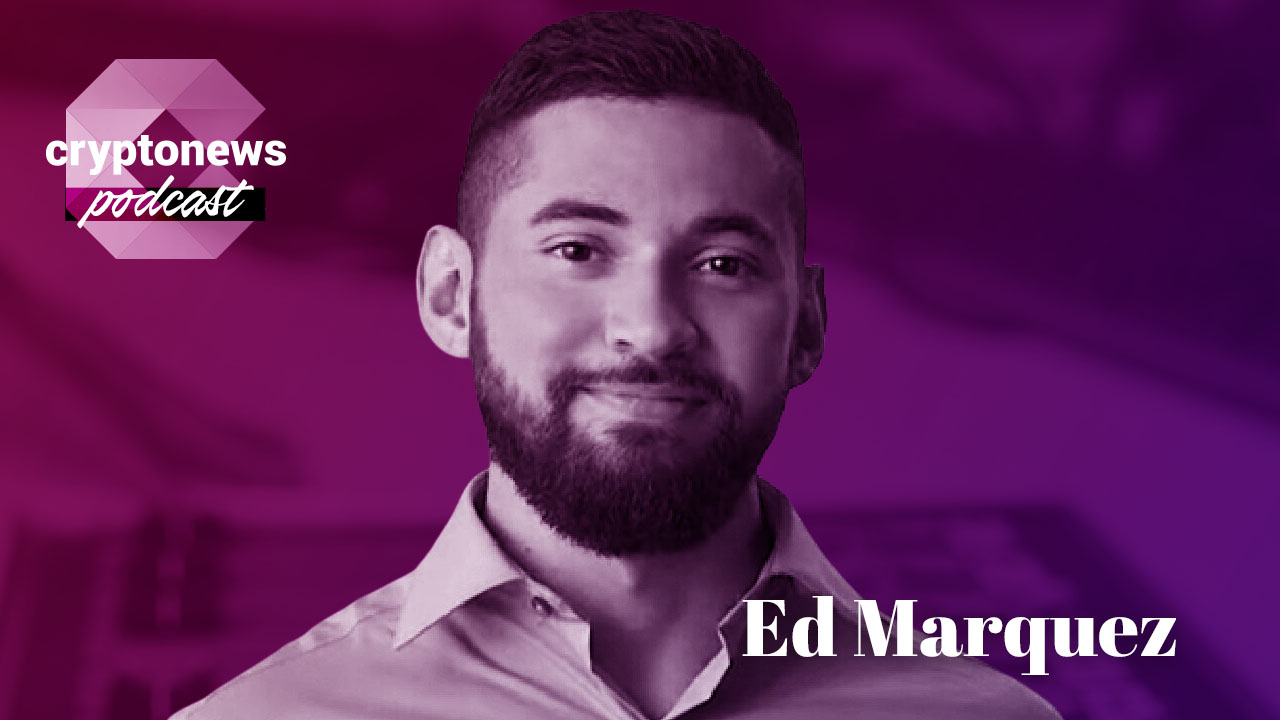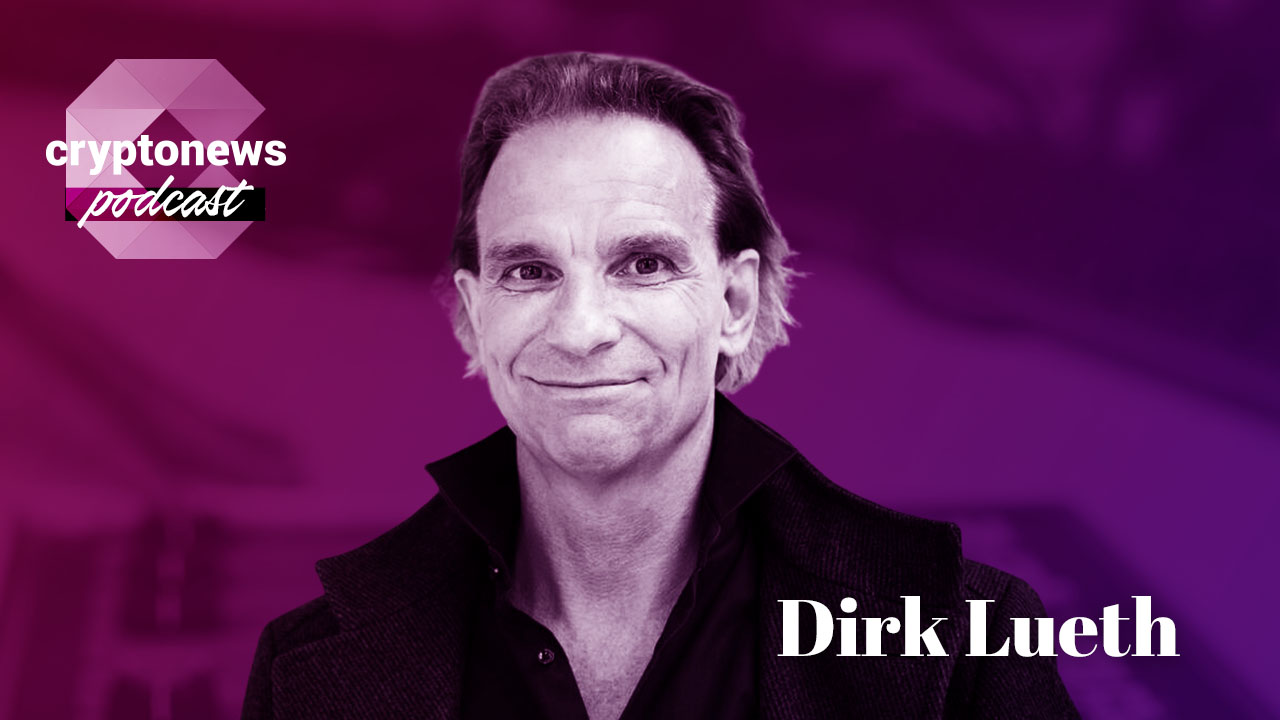Navin Vethanayagam, Chief Brain at IQ.wiki, on The Future of AI & Blockchain, Friend.tech, and Grayscale Bitcoin ETF | Ep. 261
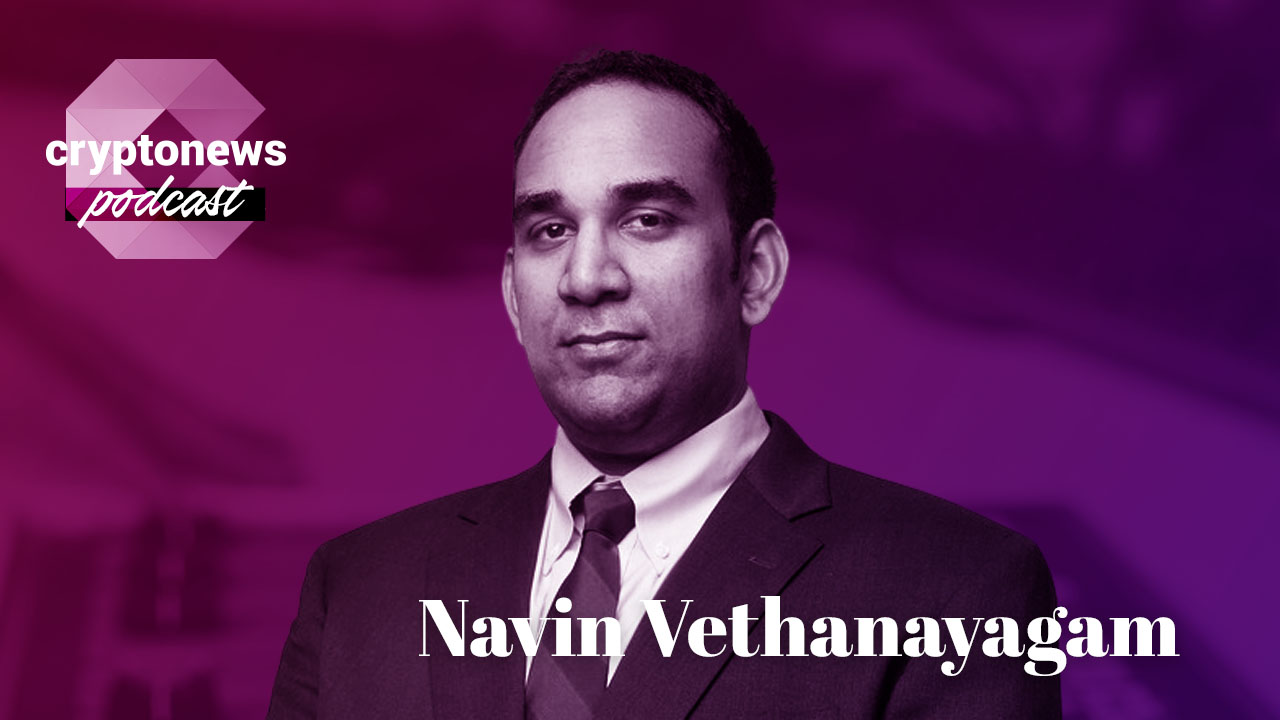
In an exclusive interview with cryptonews.com, Navin Vethanayagam, Chief Brain of IQ.wiki, talks about The future of AI x blockchain, the disruptive potential of collaborative AI-blockchain applications, and blockchain's role in restoring trust by tracking and verifying content authenticity.
About Navin Vethanayagam
Navin Vethanayagam serves as the Chief Brain of the IQ.wiki platform working to grow the site's traffic and community. He first joined IQ.wiki formerly Everipedia as a founding team member at the age of 19, gaining experience over the years in community management, marketing, press and international business. He was previously the Chief Community Officer of Everipedia where he focused on growing the site's traffic by focusing on its community, social channels, and press relations. He is also the Galaxy Brain of BrainDAO, which manages the IQ token.
Navin Vethanayagam gave a wide-ranging exclusive interview which you can see below, and we are happy for you to use it for publication provided there is a credit to www.cryptonews.com.
Highlights Of The Interview
- The future of AI x Blockchain
- The disruptive potential of collaborative AI-blockchain applications
- The open-source and decentralized nature of IQ.wiki
- Significance of AI-powered knowledge tools for Web3 communities
- Blockchain's role in restoring trust by tracking and verifying content authenticity



Full Transcript Of The Interview
Matt Zahab
Ladies and gentlemen, welcome back to the Cryptonews Podcast. We are buzzing as always. It's your host, Matt Zahab. We are back in Toronto. Had a good little rip on the west coast in LA. Also got to experience my first hurricane, which no offense to my LA folks like Navin, but that was the softest hurricane I've ever seen in my life. That was a Thursday afternoon Toronto rainfall that was softer than a soup sandwich. But you can't win them all. Super pumped to have my guest on today. Navin Vethanayagam, who serves as the Chief Brain of the IQ.wiki platform working to grow the site's traffic and community. He first joined IQ.wiki, formerly known as Everipedia, as a founding team member at the age of 19, gaining experience over the years of community management, marketing, press and international business. He was previously the Chief Community Officer for Everipedia where he focused on growing the site's traffic by focusing on its community, social channels and press relations. He's also the Galaxy Brain of BrainDAO which manages the IQ token. It's been a hot minute. Super pumped to have you on. Welcome to show my friend.
Navin Vethanayagam
Thank you. It's great to be here.
Matt Zahab
Canadian lad back on the show. We love to see that. You said born and rAI'sed in Ottawa.
Navin Vethanayagam
Yes, born and rAI'sed in Ottawa. I was born and raised in Canada. Just outside of just out of Ottawa. Right near Scotiabank. The big arena with the Sun's play.
Matt Zahab
Yeah. For the listeners at home, aren't familiar with that. Ottawa Senators, the professional hockey team in beautiful Ottawa, the capital of Canada. I bet you 99% of you would have it was Toronto or Vancouver or Montreal, but it is actually Ottawa, which is a beautiful small city 4 hours northeast of Toronto. And it does suck going to games there because you have to take a 30 minutes commute from the city and every arena in the world should be buzzing in the downtown core. But story for another day, a couple of things to discuss. Let's go back to that hurricane. You're on the west coast now, Right?
Navin Vethanayagam
Yeah.
Matt Zahab
Are you in LA or are you in San Fran?
Navin Vethanayagam
I'm in Westwood. So right in the heart of LA.
Matt Zahab
Okay. Bingo. I was literally there just this weekend. We were staying in Brentwood. What was with the hurricane? Why why was everyone losing it and putting down sandbags? Is it an infrastructure problem? What's the deal? Because that was like the first hurricane in 30 years or something. But everyone was going bananas. It was the softest hell.
Navin Vethanayagam
People were going bananas. But yeah, nothing really happened. There was like a little bit of rain. It was a decent amount of rain, but it was nothing like a hurricane. It's like a normal storm for most people. Wasn't anything too scary, but I think part of it was like they didn't know where the hurricane was going to hit, so it ended up going east like it kind of went on a curve. So I think it hit San Diego in places a lot harder. And then it went on a bit of a curve and then hit more inland in the east side. But yeah, we were both staying on the west side, so didn't really affect us too much. And then the quake, but also, again I didn't feel it.
Matt Zahab
We were in Culver when it hit and we definitely felt it pretty wild. Again, these kind of things don't grow on the East Coast. Well, at least northeast in Toronto and Ottawa. Right? I don't think we've ever had a hurricane, but let's jump into some crypto friendly stuff. The biggest story of the day and again, this episode is going to air on Thursday, the 31 August. But the big news, which we've all been waiting for. Grayscale wins the SEC lawsuit for Bitcoin ETF review. This is absolute huge news. We had a lovely fat, tall green Bitcoin wick which we love to see. All those green candles, keep them coming. What do you think of this? This is pretty crazy. I mean, it's good. We sort of knew it was coming. The BlackRock one is going to follow. The domino effect should follow. The train has left the station. What's your long term view on this?
Navin Vethanayagam
I think that's the main thing right there. It's the domino effect. So as more institutions get involved, they are not going to want to get left behind. So if Grayscale is getting approvals, if BlackRock is getting approvals, you can bet that there's a lot of other banks that are watching them and their shareholders are watching them, too. And they're going to say, hey, we don't want you to miss out on this business and we want you to get in on there. So I think the dominoes will start piling up and people will start getting more and more involved. And I think we're going to see a lot of institutional players get involved.
Matt Zahab
How long do you think until the BlackRock one happens as well? Because I don't see how Grayscale gets prudent. BlackRock doesn't. And if BlackRock does, I mean, that in theory and practicality should mean if.
Navin Vethanayagam
I can't predict, really, it's very tough to predict the united states courts. But yeah, I mean, I agree with you. I don't think it should be very far off if Grayscale is able to move. And we've been having a lot of good wins recently with crypto XRP case, now this. So we're definitely headed in the right direction.
Matt Zahab
And speaking of crypto wins, one of the I don't know if we can quantify this as a win just yet, navin, but Friend.tech absolutely blowing up. I know things are blowing up in Web3 when my Web2 friends are calling me and texting me asking me what the heck Friend.tech is and should I get on. I'm not on. I personally, again, I don't know if I believe in the long term use case. I think if a lot of big dog Web2 folks guys and gals get onboarded that are not in the sort of porn star/OnlyFans realm, I do think we can really get some steam, but without that, I think we're hooped. I'd love to just flip the ball over to your court, give our listeners a quick primer on what is Friend.tech and whether you think this actually has legs or not.
Navin Vethanayagam
So Friend.tech is a pretty interesting site, so they're running it as a site instead of an app so they don't have to comply with all the App Store requirements. And it's quite challenging to operate on the App Store as a crypto application. But it is getting pretty big on the mobile web and basically it's a social net work where people can share updates and also people can buy and sell shares of themselves. I guess that's the way it's pitched. But really it's just access to their chat groups, private chat groups. So I think it's interesting. Influencers are becoming more and more of a big thing. We can see the influencer economy is growing and then if people have paycheck groups, I think it's interesting people always want more access to their favorite creators, whether it's Patreon is a huge business, Right? In terms of people watching favorite YouTubers and then they want exclusive content and just access to ask questions and things. So I think Friend.tech, I think it could grow. I think it could become big. It's got backing from Paradigm, so they're well funded and it seems to be growing. I think there is going to be some concerns around the idea of people selling their own shares of themselves. But I think people should look at it as a fun thing that if they want to try, I wouldn't advise going all in, investing your savings or anything like that, but as a fun thing to just try out and learn more about crypto and just to get in touch with friends or if you have a favorite influencer and to join their chat group. I think it's a fun thing.
Matt Zahab
What about the use case of it though? Because I see it as like a two pronged use case, primarily similar to most crypto applications protocols whatever you wanna call it. It is profit based, whether the teams will admit it or not, the users are in there to make some cake. It's unfortunate, but it's the way she goes. It's a matter of the fact. With that being said, use case number one is of course the social casino which people have had these ideas all the time, right? Where it's like for example, you're wearing a sweet LeBron shirt. I would have loved to buy LeBron shirt when he entered the age at the ripe age of 18. I would be a very wealthy man right now. But C'est la vie, that wasn't the case. People always talk about buying shares in teams, which you can do for some European football teams. Like Manu is publicly traded. But now we have an opportunity to actually invest in our friends and not just friends but network or people we give a shit about, which is pretty cool. So that's aspect number one. Aspect number two is the actual non financial value you get out of it, which is are these group chats really that worth it? Is that much alpha being reciprocated for the OnlyFans girls are the nudes that fire, you know what I mean? Is there value in the app itself that's non financial? That's what I would love to know. Navin, what do you think?
Navin Vethanayagam
Both questions are good, so I think I'll tackle the second one first. But I think value is very variable thing, right? It's incredibly subjective. Obviously OnlyFans people pay billions for OnlyFans in total on aggregate. So there are people who find value in that and probably some of that is on Frontech as well. And then I think there's Patreon stuff like that where people are subscribing to their favorite creators and Twitch Streamers as well. People are spending tons and tons of money on that. So I think there is value in that sense. I wouldn't say like you're going to get some great alpha necessarily because like anything, if people really have truly great alpha, they're not going to share with everybody, they're just going to use it themselves, right? Or maybe it's under lock or they're not going to necessarily share it. So I would not advise if you're trying to find the next big trading idea or something to spend a bunch of money and get shares in some top trader on Frontech, I guess. But I think it is interesting and I think. Yeah, I guess on the buying shares of people, I don't know if they're actually going to rise in value with that person's growth necessarily, because I think it's kind of a tenuous connection, right? It's not like you're getting a share in their actual earnings or growth or even sponsorships and stuff. You're not getting a share of that. You're just getting some level of access.
Matt Zahab
It's not a publicly traded company where it's like when you invest in that company, they legally by law have to let you know what is going on, good and bad. So you're capturing both the upside and the downside. It makes sense, it's fully transparent, but you don't get anything. It's weird. The one last point I'd love to touch on about Friend.tech is one of my personal issues with crypto Navin, and that is the way in which we build products. It's always built for the quick pump when it's like, let's build shit for the long game. Like Friend.tech took off out of absolutely nowhere in a three week span. It went from no one hearing about it to probably the biggest thing in crypto. Right? Obviously today you had the Grayscale news come out, but until then there was nothing really close to that. We had Ripple about a month ago, two months ago, and then it was just Friend.tech for the last two, three weeks. And you've already seen people's shares go from zero point ETH, AK, nothing all the way to one ETH and back down to like 0.1 ETH. I feel like everything in crypto would be much better and long term focused if we weren't just going for these quick little pump and dumps.
Navin Vethanayagam
It's true. I mean, a lot of crypto is speculation, sadly, a lot of what gets popular sometimes is speculation. But I think there's a lot of people building great stuff regardless, even at the bigger levels, with Frax Finance stablecoins, with us IQ and education and crypto knowledge chain link with Oracles is extremely valuable. A lot of great DEXes out there that are, you know, ironically I think the solution to SBF and all these issues with centralized exchanges is the growth of DEXes. And people are innovating there and building great tech there. So I think we're building stuff. But I do agree it is a bit of an issue that people are always trying to push speculation. It was Friend.tech and then also RollBit and stuff like that. It's innate that people will want to do that and just speculate. But majority of builders are working towards creating things that have real value. And also, I feel like in the media, often the worst of crypto is often showcased. People don't like Frax, for example, or even ENS. Something that's really positive and really cool gets barely any coverage compared to FTX.
Matt Zahab
Well said. Yeah, totally right. Let's take a bit of a right turn here. Let's jump into the bread and butter IQ.wiki. I'm going to throw the ball over to your court. Let's start with a quick elevator, pitch the TLDR on what IQ.wiki is, and then we'll get into some of the cool stuff. The future of AI and Blockchain and obviously the open sourced and decentralized nature of IQ.wiki. But the floor is yours, mate. Give us what you got.
Navin Vethanayagam
Sure. So IQ.wiki is the world's largest crypto encyclopedia. And it's not only a crypto encyclopedia in content, it's also on chain. So everything is on Polygon. So every edit is recorded on Polygon and then the data is stored on IPFS. It's a very exciting place because it's fully tailored to the crypto community. So we have integrations with CoinGecko, for example. So you can go to the Board Ape Yacht Club page and you'll see the NFT price, so you'll see the floor price, you'll see the volumes, and you can do that for any crypto token as well. We've also got integrations with ENS. So, for example, if you log in with your ENS, that will be your username and any edit you make that will show up in your feed. So the site is really tailored for the crypto community. And we have pages on everything. Everything from DeFi, to stablecoins, to concepts like twamms, to ENS, to different projects, to influencers, to this podcast to Matt. We really got everyone covered.
Matt Zahab
I love that. And just for the listeners at home, again, that is IQ.wiki. You guys have the trending wikis. You got the recent edits. Who exactly gets to go in and become an editor or a contributor, like walk me through that whole process. How do you guys get all the data up there? How do you rank? Give me the whole nine yards in that regard.
Navin Vethanayagam
So right now what we're doing is that we just have a whitelist. So it's called the brain list. You can just join and then we'll whitelist you. But in the future we plan on launching something like an NFT pass for everyone who wants to edit. So stakers will get automatic access and maybe we could also give free passes to schools, universities, to kind of get the ball rolling in terms of people editing and contributing. So we got a couple of different ideas there in terms of getting that going, in terms of editing.
Matt Zahab
And obviously one of the things that you guys really push, and I'm a huge fan of this, I love the heck out of this is the sort of open sourceness and decentralized nature of IQ.wiki. Again, you got to walk me through all of this because this is exactly what we need. Can't be centralized, cannot be one group, one person or one group controlling everything. You guys are spreading it out across the float and I love to see that. So I'd love if you could just let myself and our listeners know how the concept is open source and how it has its decentralized nature.
Navin Vethanayagam
Yeah, so everything is open source. So you can see everything on GitHub. You can just Google IQ.wiki GitHub. And the cool thing is actually the best alpha is actually right in the GitHub because you can see what people are pushing, what people are editing, not pushing to the code base, what people are working on. You'll see what the devs are doing. So that's kind of a little secret there. You can always check there to see what's coming next. There's no explanations because they're just coding as fast as they can. But that's the real alpha. So everything is really up there on GitHub. That's the open source nature of what we do. And then in terms of decentralization, we do a couple of things. So every edit is hashed on chain, so on Polygon, so there'll be a hash or record of every single edit. So that way there's a real history of edits. So it's not just stored on some database that someone can wipe out or can be lost. It's actually on the Polygon blockchain. And then the data itself would be cost prohibitive to actually store on a blockchain. So we use IPFS, which is fully centralized across the world and distributed. So that way you're not really dependent on any major company. You're not dependent on just us as a team. Everything is really on chain, so we really focus on that.
Matt Zahab
I love that.
Navin Vethanayagam
Oh, thank you. And then the final part is the IQ token. So the project is governed by the IQ token holders and stakers. So we have proposals on snapshot. Anyone from the community can propose something like they want to change either to the protocol itself and the token or to the platform and how things are governed, what the standards are. All of that can be voted on. Anyone can create a proposal.
Matt Zahab
Interesting. And the coin is called IQ tokens?
Navin Vethanayagam
Yeah, it's called IQ. The token is called IQ.
Matt Zahab
That's wild. I feel like you guys, in full disclosure, I have not been in the Discord or the Telegram, but I feel like there's got to be some wild comparisons to IQ token holders versus people's actual IQ. I'm sure there's some good spicy and fiery takes that's probably a lot of fun, but we do need to take a quick break and give a huge shout out to our sponsor of the show, Prime XBT we absolutely love these guys and gals, of course, longtime friends of cryptonews.com and longtime sponsors of the Cryptonews Podcast. PrimeXBT offers a robust trading system for both beginners and professional traders. It doesn't matter if you're a rookie or a vet, you can easily design and customize your layouts and widgets to best fit your trading style. PrimeXBT is also running an exclusive promotion for listeners of the Cryptonews Podcast. You get 50% of your deposit credited to your trading account. The promo code is CRYPTONEWS50, and that is CRYPTONEWS50. CRYPTONEWS50 all one word to receive 50% of your deposit credited to your trading account. Now back to the show. We need to talk about another emerging tech, and that is the one and only artificial intelligence AI. AI is taken over. AI is still extremely trendy. Not as trendy as it was a couple months ago, but still absolutely buzzing. You guys are one of the few teams who are really actually integrating and utilizing AI. Before we get into how you and the team are implementing this Navin, I'd love to hear your thoughts on the future of AI and crypto, or more specifically, the future of AI and Blockchain, two crazy industries with a very high ceiling. How are these two going to work together in order to smash through those barriers and get to the next level?
Navin Vethanayagam
I think both will help each other. I think both AI will help crypto and crypto will help AI. So crypto, one of the main barriers is understanding. It's really challenging to understand what's going on in crypto. The industry moves so fast and there's a lot of technology involved. So, for example, people are always looking at meme coins and you think it's just a fun, simple thing, but there's so many scams and it's hard to understand if you understand the contract, it's very easy because you can see, oh, okay, this guy none of the liquidity is locked, for example, or you can see it's a honeypot right away. And there are tools like DEXTools and GoPlus and stuff like that, that are making it a little bit better for people. But I think AI. Is going to be one of those things that can cipher contracts. So I think that's going to be something that's very valuable. For example, if a hack happens, all of my buddies who are developers, they just go on Etherscan and they look at it and it's very simple to them. But for the average consumer, the average retail trader, it's very hard to understand what's going on. So I think Blockchain will be able to explain those transactions in a way that regular people can understand. So for example, maybe you just put in a bunch of transactions and you have the hashes from Etherscan, you just put it in and it explains what's going on. So I think that's going to be one big thing, is just improving and understanding. Another big thing is, for example, right now crypto funds, they'll have interns and tons of people doing research. And this isn't really limited just to crypto. Same thing with hedge funds and all of that, but I think AI could help people a lot in their own research. And DYOR, as we all say in crypto, do your own research, is a good model, but it's very challenging for most people. Right? We don't all have a million hours to read through all the white papers, all the Twitter updates, all the threads, all the medium posts. So I think one solution for that is AI to summarize all that data and help people process it. So I think that's really one of the key things that's going to help crypto in terms of helping AI, I think crypto can be used as an incentive for development. So one of the biggest issues with AI right now is that the development is very centralized. So almost all the development is happening at the high level at companies like Bart, with Google or with OpenAI, which is a huge nonprofit which is backed by Microsoft and the biggest players. So for independent AI researchers, they're struggling a lot in terms of a lot of them are getting hired by those companies and there's not as much independent development going on. But I think, for example, tokens like IQ could be used to incentivize the development and training of AI's. So people could, for example, earn rewards for editing, so like AI programs could earn rewards for editing and then humans could get rewarded for critiquing and rating those AI edits, for example. So I think there's an opportunity for people to work together with AI.
Matt Zahab
When did you get your feet wet with AI? For me it was late last year with ChatGPT and very early stable diffusion models. But what about you? When did you get into it?
Navin Vethanayagam
Same. As soon as ChatGPT launched, we were really excited about it because this is something we'd always thought about. We had always wondered, is there a way to make wikis easier? Because it can take a lot of time writing the wikis, adding all the information, and then also citations. So for a lot of people, especially subject matter experts, most of these guys are pretty busy. So something that can help make because a lot of people want to contribute, but they don't don't have the time, or it's just too challenging to figure out how to do all the citations and all the information. There's kind of a lot of work like that and doing summaries and things like that. So we figured, hey, I wish there was a way that we could make that easier. But at the time, there was nothing that was off the shelf that we could just use. And we were already busy with all the crypto development. So when ChatGPT came out, we were like, wow, this is perfect. This is something that's already built, that's pretty easy to use and integrate. And the API is open. So as soon as we saw that blowing up and we saw 100 million users, we're like, we got to integrate this. And how we started with that was that I kind of noticed, like, ChatGPT, obviously, hallucinations is a big issue. So we were like, we can't just have it write wikis by itself. That doesn't make sense. So I was like, what can ChatGPT do really well? And one of the things I found was summaries, because our editors create really great pages, but I always find myself and for a lot of our editors, the hardest part is summarizing that 1000, 2000 word wiki that you wrote into like 30 words for search engines. I'm sure you know the feeling, Right? With YouTube videos, it's like, you got to get that headline right or that little summary you write and you spend like an hour making this great video, and then you're like, you're agonizing over those, like, 30 words. But actually, AI does a really good job of that because it doesn't have to just literally looking at the data that's already there. So there's no opportunity, really to hallucinate. So we figured that's a really good use case. So that's how we first integrated GPT-3 when it first came out, is that we used it for summaries when people create wikis.
Matt Zahab
And is this different than IQ GPT?
Navin Vethanayagam
Yeah.
Matt Zahab
So IQ GPT is your AI powered search engine. One stop shop lets you access all and everything that's related to IQ.wiki on your website. So pretty much anything someone wants to get very quickly, they fired into the IQ GPT search bar and boom, that's all there is to it?
Navin Vethanayagam
Pretty much. But I would say IQ GPT goes a lot further than that. So, yeah, with IQ.wiki, we were kind of testing and seeing how we could integrate AI. Then we also noticed with ChatGPT, the other issue was that we'd ask it crypto questions and things in crypto, and sometimes it would just get the context wrong. So if I ask, what is Pepe to ChatGPT, it's probably going to tell me just about the memes and all that, which is cool, but I want to know about the crypto. So if you just ask, what is Pepe do? I could GPT will probably give you something right about the cryptocurrency. And also we also have plugins for CoinGecko, so you can get data. Like one of the coolest ones that's an example is you could ask, what are the top 100 cryptocurrencies or the top ten cryptocurrencies with over 100 million market cap that grew the most in the last year? And it will make you a table and everything. Just showing all that data. And that would take maybe an intern, maybe like an hour to go through all of CoinGecko, find the ones that did the best, and then write out a table about it. So it really saves a lot of time. So that's kind of where we saw, like, IQ GPT being tool for traders and for people looking to learn. Our goal in general is to make IQ GPT the Bloomberg terminal of the crypto industry.
Matt Zahab
Yeah, that's just wild stuff right there, Navin, I mean, I'm thinking about all my analyst friends who literally do that all day long now. Now their job is redundant. If you fire up IQ GPT, and boom I mean, that's absolutely wild stuff. Another point I'd love to go over, and I've even found this myself. And mind you, I'm not an early adopter, but some of the challenges of being an early AI adopter, like, I even think about when I was messing around with the early models of stable diffusion, which is the text to image model of AI, it was just terrible to use. The UX was horrendous. The pictures that were being put out were average at best. Now they're absolutely stunning. Like ten out of ten stuff I could never even dream of. It's funny. On the flip side, we have ChatGPT, where a lot of people, myself included, I believe it's regressed to a point where I feel like its peak was sort of Feb to May of this year, where everything that you asked it to do was relatively fire. And now I think it's just not spitting out the best stuff. But nonetheless, as someone who got into AI earlier than me, I'd love if you could speak about the challenges of being an early adopter in the space, what you learned, what you wish you did differently, and perhaps if you're seeing any of those solutions that are now present for the problems that were there in the past.
Navin Vethanayagam
Yeah, I think early on, one of the biggest challenges with all these hallucinations, because it is a big issue. So we were wondering, how do we kind of solve this? And I think you need a lot of human testing, actually, for all these AI's. It's kind of funny when you think about it, but, yeah, you do really need a lot of human testing. And that's kind of what we did for months before we launched. We just had all of our Brain Dala team members have testing every day, asking questions every day, and we noticed a couple of issues, kind of that are regularly happening. Right? So one thing is kind of the crypto terminology. I think AI's have trouble with that. So, for example, if I said it was meme tokens. We asked, what are the top ten meme tokens? But the AI didn't know what that meant. So we looked at CoinGecko and CoinGecko. I think they said meme coins. And then the AI got confused and it said there is no meme token or something silly like that. But it's a simple fix once you have the human knowledge. So we picked it up immediately and then that data just has to be tagged and you need to fine tune the model. And then we did a lot of that. I think that's one thing that anyone who's building an AI to be aware of is that you're going to need to put a lot of time in terms of fine tuning, in terms of testing, in terms of but I think that's also where a lot of smaller companies are going to thrive, because a lot of the huge stuff is kind of dominated by the major players. But where a lot of businesses are going to go is this kind of niche models I think is going to be a huge thing, these tailored models for specific industries. And I think it's possible IQ GPT maybe we even go deeper and make custom models that are more specific to deepphi or yield farming because I think yield farming would be a really interesting thing to get into.
Matt Zahab
You could also almost not open source but let people have access to that model and fine tune it to their needs. Similar to what I guess OpenAI did with ChatGPT where if you are an enterprise, they are letting you come in and instead of building your own LLM, they let you roll in, take theirs now and fine tune it to all your stuff to just make life a million times easier. Pretty cool stuff. On the topic of AI and blockchain, are there any other areas besides knowledge verification, content, authenticity, any of that kind of stuff? Is there anything else that really gets you going right now Navin?
Navin Vethanayagam
So this one is not as much related to crypto, but I think it is going to be huge for crypto since crypto is a very global industry. I think one of the big things that AI is going to help with is translation because right now there's so many different communities across the world. For example, our director of Bizdev is based in South Korea. But sometimes it's kind of challenging for me to understand what's going on in Korea because so much of the news is by Korean outlets by nature and the language is so different from English that if I use Google Translate I'll kind of get it. But not completely, especially when it's a niche topic like crypto, because there's going to be a lot of slang terms that are not really going to be covered by Google Translate. So by using AI, I think people are going to be able to work much more together. And I think it's going to be huge for DAOs, it's going to be huge for cryptos, and it's going to be huge for allowing greater access for people to get involved from different countries.
Matt Zahab
So cool. I mean, trying to learn Spanish right now, currently using Duolingo and it'd be sweet if I could actually have someone to talk to at all times, ask questions and they speak back to me. It's not just sort of the one way back and forth. It's actually dual. I mean, dual lingo. I know it's duo and not dual, but C'est la vie way she goes. Navin this has been an absolute treat. Last segment of the show, we always jump into the hot take factory where you and I get our shit kicking boots on. We let a couple hot takes fly. Doesn't have to be crypto or AI related. Can be health, wealth, happiness, can get spicy, go politics, space, aliens, you name it. But give me a couple of Navin hot takes before we let you go.
Navin Vethanayagam
I guess I think one of the hot takes is I am very pro AI. I don't think that it's going to have a lot of negative impacts. I don't think that we're going to have this massive uprising of the AI's against humans. And I don't think that's going to happen in our lifetime. I think that AI is going to be a huge benefit. I think it's going to save a lot of time for people. It's going to allow people to get more done. I think it's going to be one of those things that really boosts productivity. And I think that's what we need right now is because I think we're having a big issue in the economy right now where people are not able to scale, where businesses are not able to scale. I think this is going to be that new revolution, unlocks a huge growth the same way the Internet was a massive boom. And I think the early adopters are really going to benefit and the people who don't are going to get left behind. So I think to get maybe a little bit political is that I think countries that adopt AI and also technologies like Blockchain, they are going to grow much faster than countries that go against it.
Matt Zahab
Very true. What's your two cent for just getting reps in for blockchain? Me, I just tell people I'm no free ad, so I'm not going to name out all the newsletters and people that I follow and subscribe to because there's a bunch of them. But the basic ones find your favorite stable diffusion model, find your favorite chat, like ChatGPT model, mess around with them, put in ten minutes a day for each of them. If you do that, you're going to be in the top 1%. The rest will take care of itself. What's your advice to somebody who wants to learn about AI and become more immersed in the space?
Navin Vethanayagam
Yeah, I agree. I would say if you want to get involved in AI and you want to learn, the first step and the easiest step is to start trying it out. And it's great because actually all these models are pretty much free. Bart is free, ChatGPT is free and you can get started for free. And then if you really like it, you can get the premium later. IQ GPT, that's our product. So you can actually join the waitlist right now iqgpt.com. And then if you are an IQ token holder and you've staked 100,000 high IQ, you get automatic access right away. And in the future, we're going to roll out premium features as well. So those are a couple of places to get started, I would say, to listen to great podcasts like this one where you're going to learn about the AI discussions in crypto. I saw a good Twitter space today, actually. A lot of good Twitter spaces as well. Twitter is always a great place to learn about both AI and crypto and tech itself. Funny enough, that's actually how I got into IQ.wiki was through Twitter. So you can follow a lot of founders, a lot of interesting stuff going on there. Yeah, especially if you're really young. I would say one of the first steps is to just follow people on Twitter and just learn from them and just see what people are talking about, see what's interesting to you. And then if that is interesting to you, learn more about it.
Matt Zahab
Yeah, it's wild how much alpha you can get from Twitter. I mean, even if you're paying it's. Eight bones a like. The easiest money ever. I dead ass. I'd probably pay $50 a month for Twitter, and I just promote the podcast on Twitter. That's it. Otherwise, I don't tweet, but what I learn is absolutely world class. So shout out Elon and the Twitter/X team, who also actually just filed a bunch of paperwork to allow crypto trading on the platform too. So good day for crypto. Bitcoin ETF, Elon, Friend.tech still buzzing. We'd love to see it. Navin, appreciate you coming on, man. Absolutely incredible episode. Before you go, can you please let our listeners know where they can find you and IQ.wiki online and on socials?
Navin Vethanayagam
Yeah, so IQ.wiki, you can follow us on Twitter. It's just @IQWIKI. For me, you can just search my name, Navin Vethanayagam, but I think you'll probably find me if you just say Navinv or just Google me and you'll see my IQ.wiki page. So I would say definitely check out IQ.wiki. Check out iqgpt.com. Make sure to sign up for the waitlist. Or if you have IQ tokens, or if you want to get some, you can get some IQ tokens and you can stake them, and then you'll be able to use IQ GPT automatically right away, and you'll get those premium features as well. So I would say check out all those things.
Matt Zahab
Love that. Navin, thank you so much. Absolute treat. A pleasure. Appreciate you coming on. Can't wait for round two, my friend.
Navin Vethanayagam
Definitely. Thank you for having me. It was a blast.
Matt Zahab
Folks what an episode with Navin dropping knowledge bombs left, right and center, bringing the noise on everything AI and blockchain related. The future of AI and Blockchain. Friend.tech, Grayscale, Bitcoin, ETF. You name it, we discussed it. Hope you guys enjoyed this one. If you did, please do subscribe. It would mean the world to my team, and I. Speaking to the team love you guys so much. Thank you for everything. Justas, my amazing sound editor, appreciate you as always my man would be lost without you. And back to the listeners. Love you guys. Keep on growing those bags. Hope you enjoyed that nice green candle today. And as always, keep on staying healthy, wealthy and happy. Bye for now, and we'll talk soon.

